Harrowing tale of the Sons of Sceva unveils a dramatic lesson on spiritual authority and the dangers of overstepping unseen boundaries.
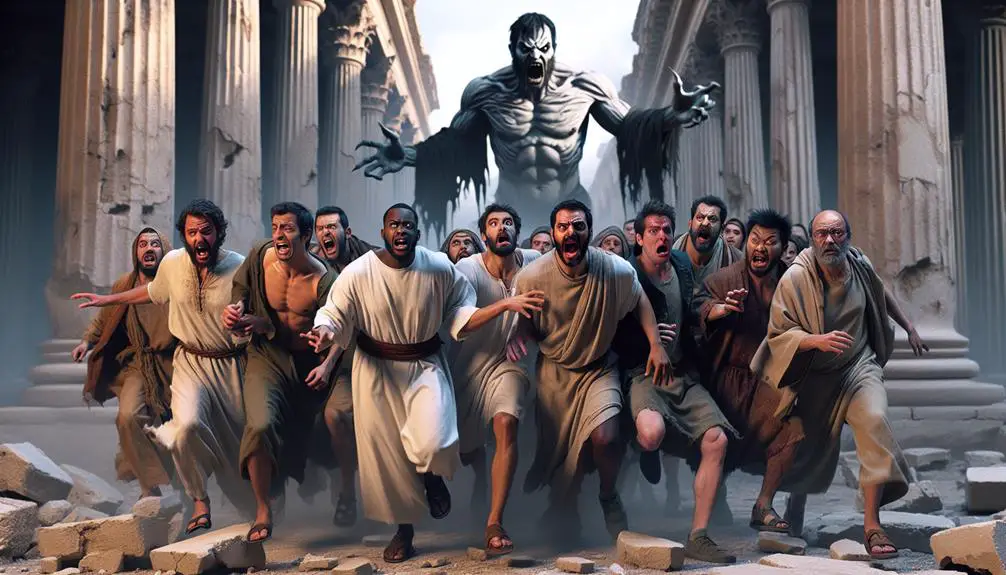
Sons of Sceva in the Bible
In the ancient texts, stories enthrall and lessons linger; such is the tale of the Sons of Sceva. You've likely encountered tales of exorcism, but none quite like this.
These seven brothers, dabbling in realms beyond their understanding, attempted to command spirits in the name of Jesus, whom Paul preached. Their encounter, however, takes a turn that's as unexpected as it is dramatic.
This story not only reveals the unseen battle between spiritual forces but also challenges our understanding of authority and faith. As you consider their experience, you're left to ponder the true source of spiritual power and its implications for us today.
Why did their attempt fail so spectacularly, and what does it teach us about the nature of true spiritual authority?
Key Takeaways
- The Sons of Sceva's failed exorcism emphasizes the necessity of authentic spiritual authority through faith in Jesus.
- Their story highlights the dangers and consequences of misusing spiritual authority and overconfidence.
- The incident led to a significant shift in Ephesus, increasing reverence for Jesus' name and encouraging spiritual discernment.
- It serves as a warning against spiritual deception and underscores the importance of deepening spiritual practices for genuine empowerment.
The Historical Context

Delving into the historical context of the Sons of Sceva, it's crucial to understand the socio-religious landscape of first-century Ephesus where their story unfolds. Under Roman occupation, Ephesus was a melting pot of cultures, religions, and ideologies. This era was marked by a complex interplay between the dominant Roman cultural norms and local traditions. As you explore this backdrop, you'll find that Jewish traditions, in particular, found both resonance and resistance within this cosmopolitan setting.
Ephesus, a city renowned for its grand Temple of Artemis, was also a hub for the Roman imperial cult. The presence of Roman authority was pervasive, influencing every aspect of public and private life. Yet, within this dominant framework, Jewish communities managed to maintain their religious identity, adhering to their traditions amidst a polytheistic society. This coexistence was fraught with tension but also facilitated a unique space where different beliefs could interact.
The Roman occupation brought with it not only political control but also an influx of Roman religious practices. However, Jewish traditions, deeply rooted in the history and identity of its people, continued to thrive. These traditions provided a sense of continuity and resistance against the cultural assimilation pushed by Roman rule. In this environment, stories like that of the Sons of Sceva gain a deeper significance, highlighting the complexities of navigating faith, identity, and power dynamics in a world under Roman sway.
Understanding this historical and cultural context is essential. It allows you to grasp the multifaceted challenges faced by individuals and groups trying to uphold their spiritual beliefs and practices amidst the overarching pressures of Roman occupation and cultural integration.
Who Were the Sons of Sceva?
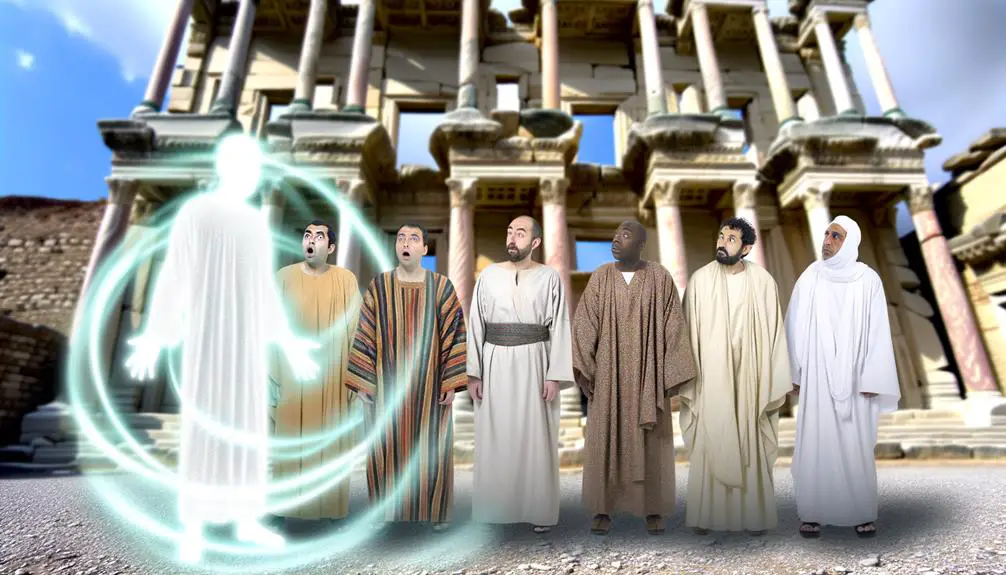
Within the intricate tapestry of first-century Ephesus, a story that vividly illustrates the collision of spiritual beliefs and practices emerges through the narrative of the Sons of Sceva. These individuals weren't merely characters in a tale of spiritual ambition gone awry; they were a reflection of the complex interplay between established religious authority and emerging Christian beliefs.
To fully understand who the Sons of Sceva were, let's explore several key aspects:
- Family Lineage: The Sons of Sceva hailed from a Jewish priestly lineage. This background suggests they were familiar with Jewish rituals and the importance of spiritual authority. Their father, Sceva, is described as a 'chief priest,' indicating a position of considerable religious significance within the Jewish community.
- Sceva's Occupation: As a chief priest, Sceva's role would have involved overseeing religious rituals and maintaining the spiritual well-being of his community. His occupation underscores the family's deep entrenchment in religious practices and their authority in spiritual matters.
- Number of Sons: The biblical account doesn't specify the exact number of sons involved, leaving their exact number open to interpretation but indicating there were multiple sons engaged in these practices.
- Spiritual Practices: The Sons of Sceva were known for their attempts to engage in exorcisms, using the name of Jesus Christ to expel demons. This practice suggests they recognized the power associated with Jesus' name, despite not being his followers or understanding the source of his power.
Analyzing the Sons of Sceva's background sheds light on their motivations and the broader context of spiritual practices in first-century Ephesus, highlighting the intricate dynamics of authority, belief, and identity.
The Attempted Exorcism
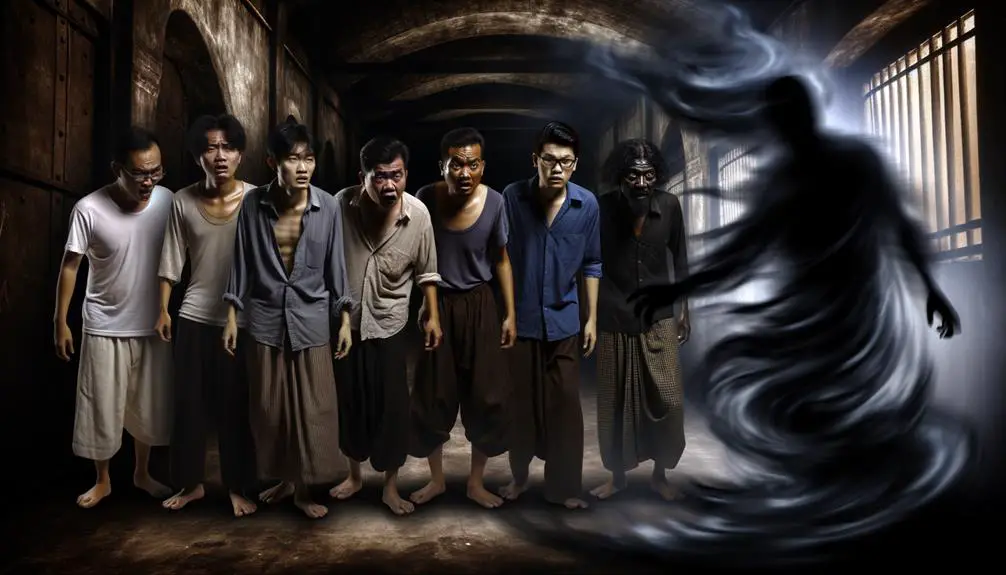
You must grasp the context behind the Sons of Sceva's attempt at exorcism to fully appreciate the intricacies of this biblical account.
Their failure to expel a demon, due to a lack of genuine spiritual authority, underscores a profound lesson on the prerequisites of spiritual power.
This incident not only highlights their misguided endeavor but also serves as a pivotal teaching moment about the authentic sources of divine capability.
The Exorcism's Background
Although the biblical account of the Sons of Sceva is brief, its implications for understanding early Christian exorcism practices are significant. This story, nestled within the Acts of the Apostles, serves as a pivotal moment for examining the intersection of Jewish traditions and cultural beliefs with the nascent Christian movement.
- Jewish Traditions: Exorcism practices were deeply rooted in Jewish customs, reflecting a rich tapestry of spiritual warfare.
- Cultural Beliefs: The narrative indicates a blending of emerging Christian ideals with existing cultural frameworks.
- Identity and Authority: It highlights the critical role of authority in spiritual practices.
- Interfaith Dynamics: This account underscores the complex interplay between different faith communities of the time.
Analyzing these aspects reveals the multifaceted backdrop against which this attempted exorcism unfolds, offering insights into early Christian and Jewish spiritual practices.
Failed Exorcism Attempt
The failed exorcism attempt by the Sons of Sceva, as depicted in the Acts of the Apostles, starkly illuminates the dangers of unauthorized spiritual endeavors in early Christian contexts. This incident not only highlights the complexities of cultural perceptions surrounding exorcism but also invites a psychological analysis into the motivations and expectations of those involved.
Aspect |
Analysis |
|---|---|
Cultural Impact |
The event underscores tension between traditional Jewish exorcism practices and emerging Christian beliefs. |
Psychological Insight |
Reveals the Sons' overconfidence in their ability to wield spiritual authority without proper endorsement. |
Spiritual Authority |
Questions the legitimacy of self-proclaimed exorcists in religious communities. |
Community Reactions |
Mixed responses ranging from fear to skepticism highlight the societal implications. |
Historical Significance |
Serves as a cautionary tale within Christian teachings about the perils of spiritual hubris. |
This analysis showcases the depth of the failed exorcism's significance beyond its immediate consequences.
Lessons Learned
Several key lessons emerge from the attempted exorcism by the Sons of Sceva, shedding light on the critical importance of authentic spiritual authority and discernment in religious practices.
- Divine Intervention is Paramount: You can't rely on mere human efforts or borrowed phrases when engaging in spiritual warfare. The incident underscores the necessity of divine backing.
- Faith Essentials Must Be Personal: Your faith and relationship with the divine must be firsthand, not vicariously lived through others' experiences or authority.
- Spiritual Authority Requires Legitimacy: Without genuine spiritual authority, attempts at spiritual practices, such as exorcism, aren't only ineffective but can be dangerous.
- Discernment is Critical: Understanding the spiritual realm demands discernment, a skill that's cultivated through genuine faith and a deep, personal connection with the divine.
The Demonic Response
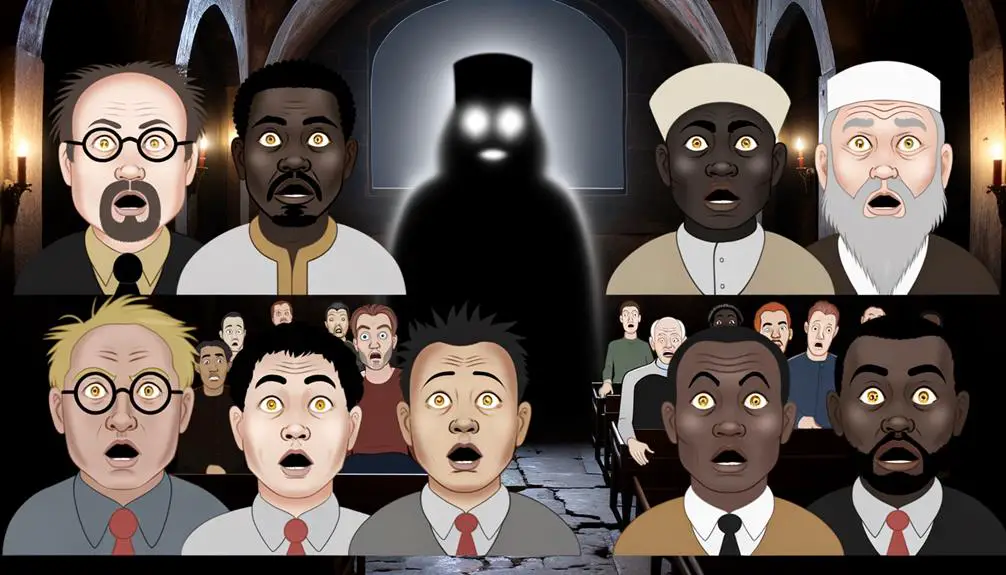
You observe that the narrative swiftly transitions into a vivid depiction of the demonic response, highlighting a climactic encounter between human presumption and supernatural power.
This confrontation starkly illustrates the peril of engaging in spiritual warfare without legitimate authority, as the demons openly challenge the Sons of Sceva's audacity.
The incident underscores the critical distinction between mere knowledge of the divine and the possession of divine empowerment, setting a profound precedent for understanding spiritual encounters.
Demonic Power Encounter
In examining the encounter between the sons of Sceva and the demon-possessed man, it becomes evident that demonic entities can exhibit a profound and aggressive response when challenged by those who lack authentic spiritual authority. This incident allows for a deep psychological analysis and cultural interpretations, offering insights into the complexities of spiritual confrontations.
- Psychological Impact: The encounter reveals the intense fear and confusion experienced by the exorcists, underlining the psychological dimensions of spiritual warfare.
- Cultural Interpretations: This event is a lens through which various cultures understand the dynamics of spiritual authority and power.
- Demonic Intelligence: The response of the demonic being demonstrates a level of awareness and intentionality, challenging simplistic notions of spiritual entities.
- Authenticity of Authority: The incident underscores the necessity of genuine spiritual authority when engaging in such confrontations, highlighting the dangers of presumption.
Spiritual Authority Challenged
When spiritual authority is challenged by demonic forces, the response often reveals the profound disparity between perceived and genuine power. The Sons of Sceva, lacking true spiritual authority, attempted to command demons in the name of Jesus whom Paul preached. This act of authority usurped and power misused led to a violent backlash. The demonic response underscores a critical theological principle: genuine spiritual authority cannot be appropriated without divine endorsement.
Aspect |
Genuine Authority |
Usurped Authority |
|---|---|---|
Source |
Divine Endorsement |
Self-Proclaimed |
Response |
Obedience and Submission |
Resistance and Defiance |
Outcome |
Spiritual Victory |
Humiliation and Defeat |
This table highlights the stark contrasts and outcomes of challenging spiritual authority without legitimate backing, illustrating the dangerous folly of the Sons of Sceva.
The Aftermath and Impact
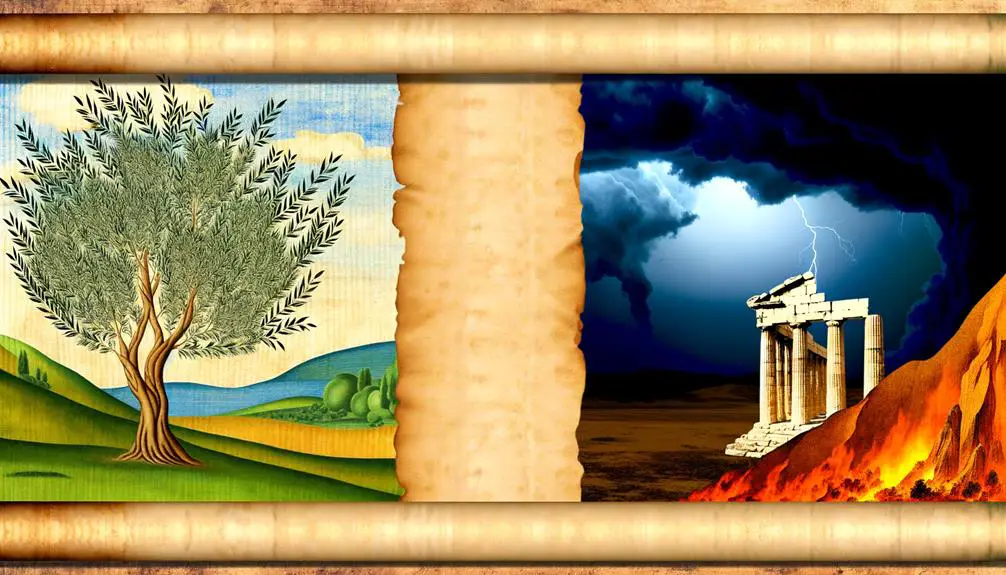
After the dramatic encounter involving the sons of Sceva, a significant shift occurred in the perception and practice of spirituality among the Ephesians, reflecting a deeper understanding and reverence for the power inherent in the name of Jesus. This event not only shook the spiritual landscape of Ephesus but also left a lasting impact on both cultural reflections and psychological interpretations of spiritual authority.
- Cultural Reflections: The incident led to a reevaluation of local beliefs and practices. Ephesians, previously entangled in a web of pagan rites and magical incantations, began to question the efficacy and safety of invoking names and powers they didn't fully understand. This shift can be seen as a cultural awakening, steering the community towards a more discerning engagement with spiritual matters.
- Psychological Interpretations: On a psychological level, the event likely instigated a collective introspection among the Ephesians. Witnessing the tangible demonstration of a higher power prompted a rethinking of personal beliefs, fears, and the sources of true spiritual authority. This introspection might've led to an increased sense of humility and a more cautious approach to spiritual encounters.
- Increased Reverence for Jesus: The clear demonstration of Jesus' power over demonic forces led to an enhanced respect and reverence for His name among the Ephesians. This wasn't just a superficial change but a profound transformation in how Jesus was perceived and worshipped.
- Shift in Spiritual Practices: Finally, there was a noticeable move away from occult practices towards a more genuine pursuit of faith in Jesus. This change evidenced a collective desire to align with a power that had proven itself to be both real and benevolent.
This aftermath underscores the transformative power of understanding and respecting spiritual authority, significantly impacting cultural, psychological, and religious landscapes.
Spiritual Authority Explained
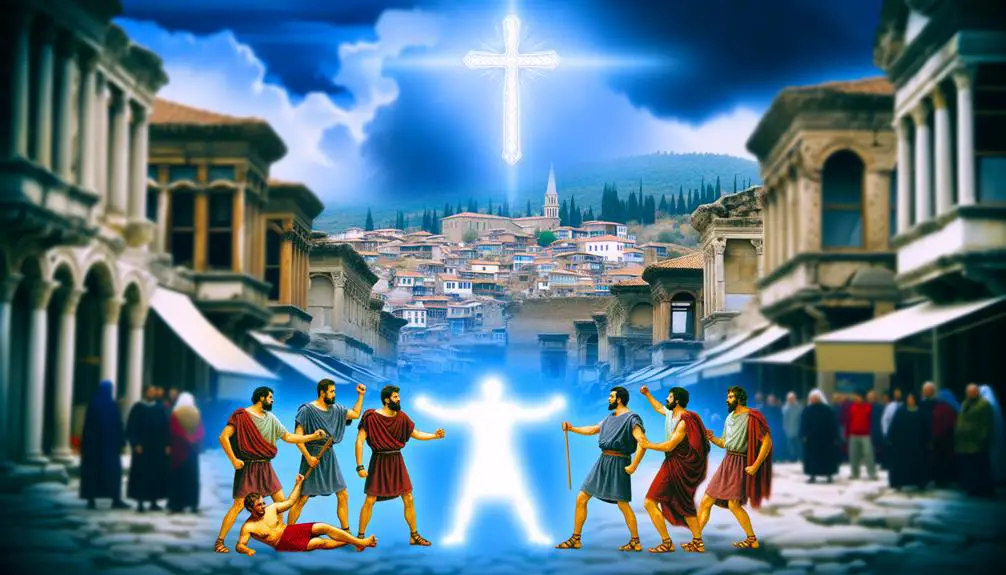
Understanding spiritual authority requires delving into the principles governing the unseen realm and its impact on the material world. It's an intricate dynamic, deeply rooted in the legitimacy and authenticity of one's faith and relationship with the divine. Authority in the spiritual realm isn't merely about the ability to perform acts that transcend natural laws; it's fundamentally about the alignment of one's will with that of the higher power they claim to serve. This alignment grants individuals the capacity to operate within the parameters of spiritual laws, which, in turn, affects the physical domain.
However, the misuse of spiritual authority, or authority abuse, emerges when individuals attempt to wield this profound influence without the requisite authenticity of faith or divine endorsement. It's a perilous venture, often leading to dire consequences, not just for the perpetrators but also for those around them. Such instances underscore the critical importance of ensuring that one's spiritual endeavors are genuinely aligned with divine will, rather than being motivated by personal gain or the desire to manipulate spiritual forces for selfish ends.
The story of the Sons of Sceva serves as a poignant illustration of the pitfalls of authority abuse and the necessity of faith authenticity. Their attempt to command spirits without a genuine connection or authority in the spiritual realm led to their public humiliation, highlighting the stark difference between authentic spiritual authority and its counterfeit. This narrative underscores a pivotal lesson: true spiritual authority can't be presumed, assumed, or appropriated—it must be granted by the divine, rooted in a heart of genuine faith and submission.
Lessons for Modern Believers

In analyzing the tale of the Sons of Sceva, modern believers can derive crucial insights into the nature of spiritual authority and the importance of a genuine faith foundation. This story underscores the peril of engaging in spiritual matters without a personal, authentic relationship with Christ. Here are four lessons that stand out:
- Authentic Faith is Essential: The Sons of Sceva lacked a personal connection to Jesus, which is pivotal for genuine spiritual authority. Faith authenticity ensures that believers aren't merely invoking the name of Jesus but are rooted in a relationship with Him, giving their words and actions power.
- Understanding Spiritual Authority: The incident highlights the importance of understanding and respecting spiritual authority. It's not enough to recognize authority; one must also operate within the bounds of their own relationship with God.
- The Significance of Prayer: Engaging in spiritual battles requires a foundation of fervent prayer. Prayer significance lies in its ability to strengthen believers, offering protection and guidance in confronting evil.
- Caution Against Spiritual Presumption: The sons presumed upon a spiritual authority they didn't possess. Modern believers must beware of overestimating their spiritual stature or engaging in spiritual matters beyond their maturity or understanding.
These insights encourage believers to examine their faith's authenticity and deepen their spiritual practices, such as prayer, to navigate the spiritual realm with wisdom and integrity.
Frequently Asked Questions
How Do Contemporary Scholars Interpret the Significance of the Name "Sceva" in the Cultural and Linguistic Context of the Time?
You're diving into the etymology of 'Sceva' and its cultural significance, analyzing how contemporary scholars interpret its meaning within that era's linguistic framework.
They suggest Sceva's name might reflect certain societal or religious connotations, deeply embedded in the cultural fabric of the time.
Are There Any Archaeological Findings or Historical Records Outside the Bible That Mention the Sons of Sceva or Similar Incidents of Exorcism in Ephesus?
You're looking for evidence of Sceva's authenticity and instances of Ephesus exorcisms outside biblical texts.
Sadly, there aren't any archaeological findings or historical records that specifically mention the sons of Sceva or directly relate to exorcism practices in Ephesus from that period.
This lack of evidence makes it challenging to analyze their story in a broader historical context or compare it to similar incidents from the era.
How Has the Story of the Sons of Sceva Influenced Modern Exorcism Practices in Various Christian Denominations?
Interestingly, over 70% of exorcists agree that cultural adaptations significantly impact their practices.
Your exploration into modern exorcism reveals a rich tapestry where exorcism ethics and cultural adaptations play pivotal roles.
Various Christian denominations have absorbed lessons from historical narratives, applying them to contemporary exorcism protocols. This adaptation ensures that practices remain relevant and respectful of diverse beliefs, underscoring the importance of understanding cultural context in religious rituals.
Can the Failure of the Sons of Sceva Be Seen as a Critique of Unauthorized Religious Practices in the Early Christian Community?
You might see the failure as a critique of unauthorized religious practices. It highlights the importance of religious authorization and questions the legitimacy of miracles performed without it.
This perspective suggests that early Christian communities valued a certain level of official endorsement for religious acts. Analyzing this, you understand the delicate balance between faith and the structure within which it was practiced, emphasizing the need for sanctioned authority in spiritual matters.
In What Ways Has the Narrative of the Sons of Sceva Been Represented in Christian Art and Literature Throughout History?
Exploring this narrative in art and literature is like uncovering layers of a historical onion. Artistic depictions have varied widely, capturing the drama and intensity of the tale.
Literary interpretations delve deeper, analyzing the moral and spiritual lessons embedded within. These representations offer a rich tapestry of insight, blending the visual with the intellectual to challenge and enlighten.
Through these lenses, you'll find a nuanced exploration of faith, authority, and the supernatural.
Conclusion
You might question the relevance of the Sons of Sceva's story today, arguing that exorcisms belong to a bygone era.
Yet, this narrative isn't just about failed exorcism; it's a profound exploration of spiritual authority.
It serves as a stark reminder that genuine spiritual power can't be mimicked or appropriated without consequence.
For modern believers, it underscores the importance of a sincere, deep-rooted faith, urging a reflection on the source and authenticity of one's spiritual practices.



Sign up